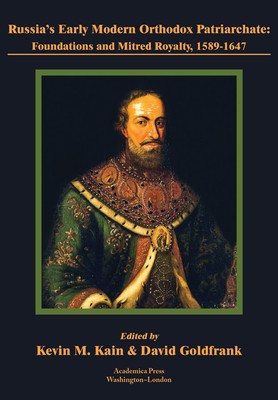
- We will send in 10–14 business days.
- Author: David Goldfrank
- Publisher: Academica Press
- ISBN-10: 168053940X
- ISBN-13: 9781680539400
- Format: 15.2 x 22.9 x 1.8 cm, kieti viršeliai
- Language: English
- SAVE -10% with code: EXTRA
Reviews
Description
Focusing on one of Russia's most powerful and wide-reaching institutions in a period of shattering dynastic crisis and immense territorial and administrative expansion, this book addresses manifestations of religious thought, practice, and artifacts revealing the permeability of political boundaries and fluid transfers of ideas, texts, people, objects, and "sacred spaces" with the rest of the Christian world. The historical background to the establishment Russia's Patriarchate, its chief religious authority, in various eparchies from Late Antiquity sets the stage. "The Tale of the Establishment of the Patriarchate," crucial for legitimizing and promoting both this institution and close cooperation with the established tetrarchy of Eastern Orthodox patriarchs emerged in the 1620s. Their attitude remained mixed, however, with persisting unease concerning Russian pretensions to equality. Regarding the most crucial "other" for Christianity's self-identification, the contradictions inherent in Christianity's appropriation of the Old Testament became apparent in, for example, the realm's imperfectly enforced ban on resident Jews. The concept of ordained royalty emerged in the purported co-rulership of the initial Romanov Tsar Michael and his father, Patriarch Filaret. As a pertinent foil to Moscow's patriarchs, challenges arose from Petro Mohyla, a metropolitan of the then totally separate Kievan church, whose Academy became the most important educational institution for the Russian Orthodox Church into the eighteenth century, combining a Romanian regal, Polish aristocratic, and Ukrainian Orthodox self-identity.
EXTRA 10 % discount with code: EXTRA
The promotion ends in 21d.07:31:39
The discount code is valid when purchasing from 10 €. Discounts do not stack.
- Author: David Goldfrank
- Publisher: Academica Press
- ISBN-10: 168053940X
- ISBN-13: 9781680539400
- Format: 15.2 x 22.9 x 1.8 cm, kieti viršeliai
- Language: English English
Focusing on one of Russia's most powerful and wide-reaching institutions in a period of shattering dynastic crisis and immense territorial and administrative expansion, this book addresses manifestations of religious thought, practice, and artifacts revealing the permeability of political boundaries and fluid transfers of ideas, texts, people, objects, and "sacred spaces" with the rest of the Christian world. The historical background to the establishment Russia's Patriarchate, its chief religious authority, in various eparchies from Late Antiquity sets the stage. "The Tale of the Establishment of the Patriarchate," crucial for legitimizing and promoting both this institution and close cooperation with the established tetrarchy of Eastern Orthodox patriarchs emerged in the 1620s. Their attitude remained mixed, however, with persisting unease concerning Russian pretensions to equality. Regarding the most crucial "other" for Christianity's self-identification, the contradictions inherent in Christianity's appropriation of the Old Testament became apparent in, for example, the realm's imperfectly enforced ban on resident Jews. The concept of ordained royalty emerged in the purported co-rulership of the initial Romanov Tsar Michael and his father, Patriarch Filaret. As a pertinent foil to Moscow's patriarchs, challenges arose from Petro Mohyla, a metropolitan of the then totally separate Kievan church, whose Academy became the most important educational institution for the Russian Orthodox Church into the eighteenth century, combining a Romanian regal, Polish aristocratic, and Ukrainian Orthodox self-identity.


Reviews